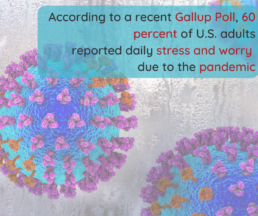Boost Your Mental Well-being During These Uncertain Times
The coronavirus (COVID-19) pandemic has caused uncertainty, stress and worry for many for the past few weeks. Even as businesses reopen and restrictions are lifted, many Americans are experiencing considerable anxiety.
With more than half of Americans reporting to Dynata, a survey insights firm, that they think the COVID-19 pandemic will last six months or more, many health experts are concerned about the nation’s mental health.
While experiencing stress or anxiety over the health and economic fears brought on by COVID-19 is normal, if you don’t take steps to cope with these feelings, you can put yourself at risk for long-term health effects.
Try these tips to keep your coronavirus-related stress and anxiety under control:

- Stay informed, but don’t obsess—It can be easy to become overwhelmed by watching the news and reviewing the updates of the COVID-19 situation. While it’s important to be informed of the situation, you should not obsess over the news.
- Focus on what you can control—Focusing on the things you can’t control, like the course of the pandemic and actions of others, will only fuel anxiety and stress. Instead, focus on things that you have control over, including staying home when possible, washing your hands, wearing a mask and practicing social distancing.
- Connect with friends and family—Sometimes, the best way to cope with your stress is to talk to a loved one. Leverage technology to safely talk with friends or family during these times.
- Use healthy coping mechanisms—There are a variety of healthy ways to mitigate your stress and anxiety, which include getting exercise, sticking to a routine, spending time outside and meditating.
- Talk to a professional—If your stress or anxiety is overwhelming, contact a licensed mental health professional.
The COVID-19 pandemic has disrupted daily life and caused stress and anxiety for many, even as we enter our new normal. If left unchecked, these feelings can have negative effects on your mental well-being. Take steps today to keep your stress and anxiety under control.
Survive the Summer Heat
Summer heat can be more than uncomfortable—it can be a threat to your health, especially for older adults and children. Whatever your age, don’t let the summer heat get the best of you.
There are two types of heat illness to keep an eye out for this summer:
- Heat exhaustion—Heat exhaustion occurs when a person cannot sweat enough to cool the body, usually the result of not drinking enough fluids during hot weather. A person suffering from heat exhaustion must move to a cool place and drink plenty of water.
- Heatstroke—Heatstroke is the result of untreated heat exhaustion and is a serious medical emergency that must be treated quickly by a professional.
To prevent heat illness this summer, make sure to drink plenty of water, wear lightweight and light-colored clothing and eat light, refreshing foods. In addition, try to stay inside as much as possible, doing chores early or late in the day. By keeping these tips in mind, you’re on your way to beating the heat.
Socially Distance Yourself This Summer
You’ve probably heard the term “social distancing” a lot in the past few months. Keeping your distance from others has been crucial to slowing the spread of COVID-19. It will also be a key component in staying healthy as things continue to reopen.
To properly practice social distancing this summer, keep the following tips in mind:
- Stay at least 6 feet—which is about two arms’ lengths—away from others.
- Avoid gathering in groups, mass gatherings or large crowds whenever possible.
- Wear a protective face mask or covering when out in public.
Keeping these tips in mind can help you remain healthy and safe this summer. For more information on social distancing, click here.
Heat Exhaustion or Heat Stroke?
Heat Exhaustion:
Dizziness or Weakness
Nausea or Vomiting
Blurry Vision
Body temperature rising above 101 F
Heat Stroke:
Unawareness of Heat or Thirst
Confusion or Delerium
Loss of Consciousness
Body temperature rising above 101 F

Nutritional Information (per serving)
| Total Calories | 200 |
| Total Fat | 4 g |
| Protein | 11 g |
| Carbohydrates | 34 g |
| Dietary Fiber | 3 g |
| Saturated Fat | 2 g |
| Total Sugars | 6 g |
Source: USDA
Quick and Easy Baked Potato Salad
Ingredients
- 1 ½ pounds red potatoes
- 1 cup nonfat plain yogurt
- ⅓ cup onion (minced)
- ½ cup shredded reduced-fat cheddar cheese
- ¼ Tbsp. fresh chives (snipped)
- 3 Tbsp. real bacon bits or pieces
- ¼ tsp. salt
- Freshly ground pepper to taste
- Chopped fresh parsley (optional)
Preparations
- Place whole potatoes (do not poke) into microwave-safe dish.
- Cover dish. (If covering dish with plastic wrap, poke small hole in plastic.)
- Microwave on high for 10 to 12 minutes depending on strength of microwave.
- Use oven mitts or a towel to remove dish from microwave; carefully remove cover from dish due to steam buildup and let cool.
- Cut potatoes into bite-sized pieces and place in a large bowel with remaining ingredients. Stir and mix well.
For more information and helpful links, please download our July 2020 Live Well, Work Well Newsletter.
This article is intended for informational purposes only and is not intended to be exhaustive, nor should any discussion or opinions be construed as professional advice. Readers should contact a health professional for appropriate advice.

